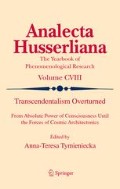Abstract
E. Husserl represents a key reference when addressing the need for a serious and exhaustive reflection on the notion of Europe, in an attempt to refute the fallacy that is being built up around its past. More than ever before, Europe urgently needs to establish an inner dialogue, and to realise that its true essence lies precisely in that “other Europe” that is being excluded and marginalised (an awareness of existence through the other). Europe needs to adopt a clear approach, accepting its intrinsic plurality and by extension the fact that its identity hinges on assuming as its own that which is superimposed upon it as being radically different. A Europe whose fuzzy, yet immensely powerful light can be seen all over the world. In keeping with the same line of thinking as that adopted by the father of phenomenology, Europe is above all the origin of the most quintessentially European event: philosophy. Indeed, it is philosophical thought that has set Europe apart from the other communities of the world. Philosophy does not target particularly privileged peoples or a specific tradition. To put it another way: philosophy is the conceptual framework that exists prior to the emergence and ultimate existence of the plural nature of the traditions and customs that are shaped to form communities, peoples, nation-states, etc. In fact, the Europeanization of the world (the generalised use of a philosophical lexis – the verbigratia of the concept of democracy) would lead to the necessary opacity and dissemination of Europe as a universal subject. Europe is philosophy and its praxis (or political perspective) the western concept of democracy. Europe must adopt a legitimising approach and relinquish its imposed universalism, timed to coincide with the “voluntary Europeanization of the world”. At all events, it should not be forgotten that Europe (and indeed the entire Western world) is experiencing a time of twilight, of self-imposed decline, of unconcealed deliquescence, precisely at a time when much of the rest of the world is enjoying the limitless expansion of the most genuinely western forms of expression.
Access this chapter
Tax calculation will be finalised at checkout
Purchases are for personal use only
References
Balibar, E. 2001. Nous, citoyens d´Europe, p. 215. París: La Découverte.
Denninger, E. 1990. Der gebändigte. Baden-Baden: Leviatán.
Derrida, J. 1991. L’autre cap, p. 30. París: Les editions de Minuiot.
Habermas, J. 1989. Identidades nacionales y postnacionales. Madrid: Tecnos.
Hegel, G.W.F. 1955. Vorlesungen ubre die Philosophie der Weltgeschichte, p. 182. Hamburg: Meister Verlag.
Husserl, E. 1950. Cartesianische Meditationen un Pariser Vorträge. The Hagues: Martines Nijhoff.
Husserl, E. 1976. Die Krisis der europäischen Wissenschaften un die transzendentale Phänomenologie. Eine Einleitung in die phänomenologie Philosophie. Den Haag: Martines Nijhoff.
Husserl, E. 1987. Philosohie als strenge Wissenschaft, Husserliana XXV. Dordrecht: Marttinus Nijhoff.
Kant, I. 1923. Zum ewigen Frieden. In Preußische Akademieausgabe, vol. VIII, p. 349. Berlín: de Gruyter.
Kant, I. 1992. The conflict of the faculties. Lincoln NE: University of Nebraska Press.
Author information
Authors and Affiliations
Corresponding author
Editor information
Editors and Affiliations
Rights and permissions
Copyright information
© 2011 Springer Science+Business Media B.V.
About this chapter
Cite this chapter
Couceiro-Bueno, J. (2011). Twilight Splendour (Phenomenological Reflections on Europe). In: Tymieniecka, AT. (eds) Transcendentalism Overturned. Analecta Husserliana, vol 108. Springer, Dordrecht. https://doi.org/10.1007/978-94-007-0624-8_28
Download citation
DOI: https://doi.org/10.1007/978-94-007-0624-8_28
Published:
Publisher Name: Springer, Dordrecht
Print ISBN: 978-94-007-0623-1
Online ISBN: 978-94-007-0624-8
eBook Packages: Humanities, Social Sciences and LawPhilosophy and Religion (R0)

